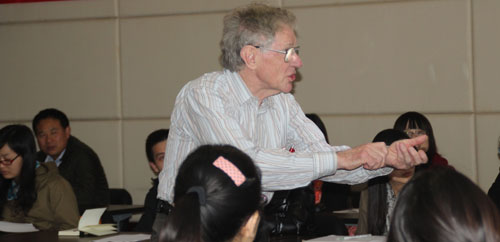In November, Dr. Iain Taylor, Professor Emeritus in the University of British Columbia (UBC) of Canada, also the Associate Editor-in-chief of the Journal of Mountain Science (JMS), visited Institute of Mountain Hazards and Environment (IMHE) and hold a workshop on scientific writing and journal editing.
Prof. Taylor has been involved in scientific publishing first with the Canadian Journal of Botany and then with the journal Cellulose. From 1991-2006 he served as Assistant Editor-in-chief of the NRC Research Press of Canada. He is currently the editor in-chief of the UBC Botanical Garden Journal, Davidsonia, and serves for the editorial boards of Canadian Pharmacists’ Journal and the BC Journal of Ecosystems and Management. He is a former organizer of the Council of Science Editors Short Course for Journal Editors. He teaches and lectures widely on best practices for editorial processes and is the founder of the UBC editors’ network.

Prof. Iain Taylor on the workshop discussion. (photo by IMHE)
During his staying in Chengdu from November 7th to 18th, Professor Taylor had a warm talk with Prof. Deng Wei, the Director of IMHE, and Prof. Wei Fangqiang, the Vice Director of IMHE. He also had a detailed discussion with Prof. Cui Peng, the editor in chief, Prof. Qiu Qunlian, executive editor in chief, and the scientific editors and editorial staffs of the JMS about how to improve journal quality and international influence of the JMS.
During a five and half days scientific writing and journal editing workshop, Professor Taylor gave editors and young scientists and Ph.D students a total of 7 sessions concerning about how to prepare and submit scientific manuscript for international journals. He gave detailed guides on how to write a research paper, and deeply discussed the ethics of scientists in preparing scientific papers such as the authorship and acknowledgement, and the ethical obligations of reviewers and editors, such as prompt response to authors and fair treatments to all authors around the world. He required the participants write their own papers during the workshop period and send their manuscripts to each other for pre-review, which, he said, was a very good way to greatly improve manuscript quality.
Several young scientists and Ph.D students said that they had benefited a lot about how to plan their research work and present their research results in writing manuscripts for international journals. The editors of the JMS said this workshop had broadened their horizons on how to operate academic journals more efficiently.